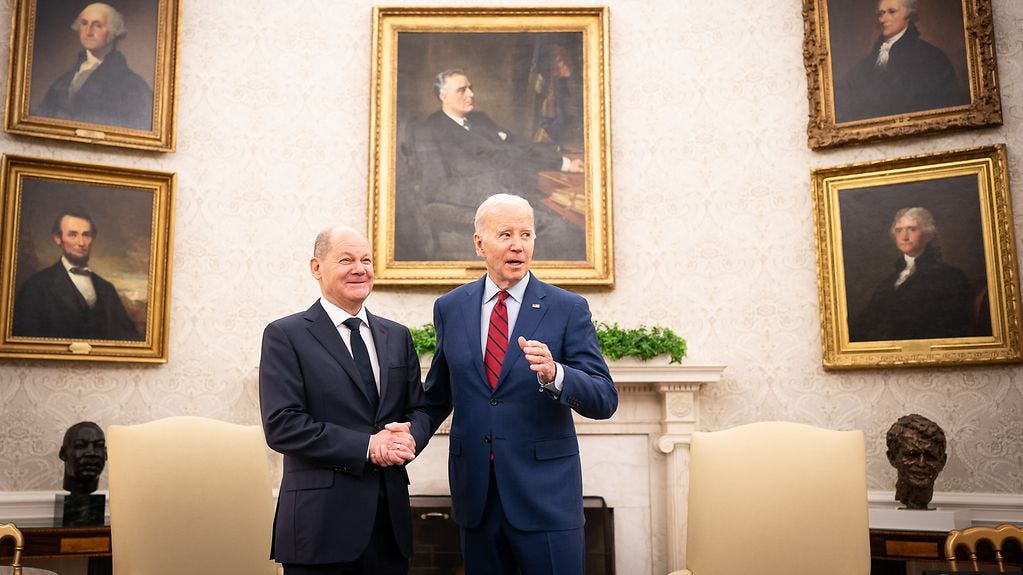The United States and Germany Need a New Approach to Risk Management in Ukraine
How Ukraine's two largest donor states fail NATO and the West.
Picture: German Federal Government / Kugler
The West's strategy in addressing the war in Ukraine is driven by a strong desire to minimize escalation risks. This is especially evident in the actions of the United States and Germany, Ukraine's two largest donors by absolute numbers.
Initially, this is not incomprehensible. After all, a state's raison d’être is to ensure the safety of its citizens, which is arguably the main responsibility of elected officials.
However, the current approach to U.S. and German risk management is dangerous. In short: By trying to minimize risks at all costs, Germany and the United States may actually drive up risks.
There are no risk-free decisions
A key fact that US and German decision-makers fail to recognize is that in the current situation, there no longer are risk free decisions. The debate over lifting targeting restrictions for Western long-range strike weapons to strike targets inside Russia exemplifies this well.
On the one hand, unlikely as it may be, there is a non-zero chance that lifting these restrictions indeed crosses some type of redline, causing Russia to escalate against NATO or to employ a nuclear weapon.
As such, not lifting targeting restrictions indeed reduces the risks of a NATO-Russia war or nuclear escalation.
On the other hand, there is also a non-zero chance that Ukraine is going to lose the war if we maintain our current stance on military assistance and continue to deny the Ukrainian army critical capabilities. In such a scenario, NATO would face the collapse of the Western security architecture that has ensured the safety and prosperity of its member states, the influx of millions of refugees from Ukraine, as well as a victorious Russia that directly threatens its borders.
In this sense, not lifting targeting restrictions, together with a general refusal to scale up military aid to Ukraine, creates its own set of dramatic risks.
The task of decision-makers is therefore to weigh risks, not to categorically avoid them. A no-risk solution is not an option at this point. The key question decision-makers have to ask is whether the residual risks of escalation justify the risks of Russian victory. In my opinion, that’s an easy answer.
Emboldening Russia
A second issue relates to the fact that by continuously signaling our inherent risk aversion and pain intolerance we are creating a dangerous asymmetry in perceived resolve.
While Berlin and Washington, D.C. have worked tirelessly to minimize and avert risks, Moscow has boldly embraced significant risks to achieve its goals. This approach began with the full-scale invasion of Ukraine and has persisted throughout the war. At this stage, Putin has placed the future of Russia and its citizens squarely on the war's outcome.
In addition, Russian decision-makers, both military and civilian, as well as Russia’s population, have shown a striking ability to tolerate pain. Despite tremendous battlefield losses and skyrocketing war costs at home, Russia remains undeterred, continuing and even expanding the conflict.
Compare this to Western decision-makers, especially those located in Washington D.C. and Berlin who retreat at the slightest hint of danger to their populations.
Again, while understandable on some level, we should be concerned about the message this sends to Russia. We're certainly not demonstrating strong resolve. Given this, how convinced would Russia be that Germany and the United States would support their Eastern European allies if Russia were to challenge NATO's territorial integrity?
I’m not trying to suggest that Berlin and Washington D.C. would definitely not come to the aid of their allies. As a German, I am confident that if war ensues, Germany will stand with its Eastern European allies.
The issue is that Putin may misinterpret the certainty of NATO’s military commitment. In this case, even if NATO remains fully united in the end and successfully counters Russia along the NATO border, NATO would still be directly engaged in a large-scale, shooting war with a nuclear power. If possible, I would like to avoid that.
To avert such a confrontation, we must deter Russia. Deterring Russia starts with showing resolve. This involves taking certain risks and the West being willing, on some level, to accept threats to its own safety.
This does not mean that Western decision-makers should act carelessly. However, they cannot categorically deny the possibility that they might need to put themselves in harm's way if push comes to shove. A growing number of European states understand this. It's time for Germany and the United States to follow suit. Doing otherwise threatens to increase risks instead of decreasing them.





"....as well as a victorious Russia that directly threatens its borders."
My grandfather told me how war drunken the German were after Hitlers successful 'Blitzkrieg' against Poland. The chering hords of the Nazis even beat up WW1 veterans in public, who warned about the effects of further escalation, and the concept of the 'Herrenrasse' was prominent in the heads of the German population.
Just listen to Solowjows daily propaganda! The risks of a 'victorious Russia', the consequences that may arise from that for peace and global security, are completely underrated in the West....
Agreed. A 100 %.